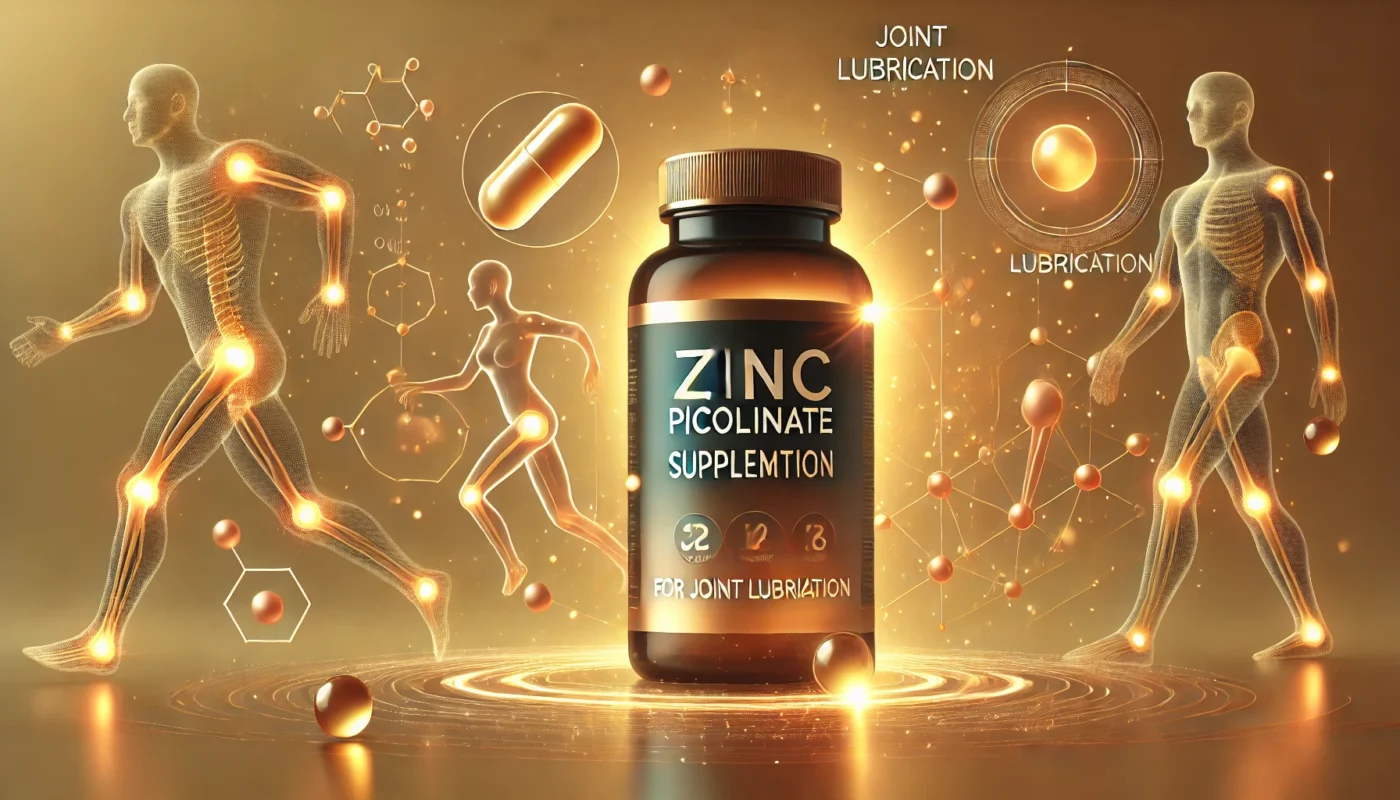Joint health is integral to maintaining mobility, flexibility, and overall quality of life. However, issues like joint stiffness and reduced range of motion are common, particularly as people age or experience conditions such as arthritis. These challenges often stem from inflammation, oxidative stress, and the degradation of cartilage and synovial fluid—the natural lubricant that reduces friction in the joints.
Zinc, a trace mineral essential for numerous physiological processes, plays a significant role in maintaining joint health. Zinc picolinate, a highly bioavailable form of zinc, offers targeted support for joint lubrication and flexibility. By reducing inflammation, supporting cartilage regeneration, and enhancing the body’s natural antioxidant defenses, zinc picolinate can help alleviate joint stiffness and improve mobility. This article explores how zinc picolinate supports better joint function, with scientific studies and clinical evidence to enhance credibility and practical utility.
You May Also Like:
Zinc Picolinate for Building Stronger Connective Tissues: What You Need to Know
Zinc Picolinate for Peak Performance: Athletes’ Secret Weapon
Zinc Picolinate for Joint Lubrication: Reducing Stiffness is an original (HSLHealing) article.
Understanding Joint Stiffness and Its Causes
Joint stiffness refers to the feeling of restricted movement or discomfort in the joints. It is often accompanied by pain or inflammation and can significantly affect daily activities.
Common Causes of Joint Stiffness:
- Osteoarthritis:
A degenerative joint condition characterized by cartilage breakdown and loss of synovial fluid. - Rheumatoid Arthritis:
An autoimmune disorder that leads to chronic inflammation and joint damage. - Aging:
Natural wear and tear reduce joint lubrication and cartilage integrity. - Inflammation:
Chronic inflammation can damage cartilage and contribute to joint stiffness. - Nutritional Deficiencies:
Lack of key nutrients like zinc can impair cartilage repair and exacerbate inflammation.
Statistics:
- According to the CDC, over 32.5 million adults in the United States are affected by osteoarthritis, with stiffness being one of the primary symptoms.

The Role of Zinc in Joint Health
Zinc is involved in a variety of processes critical to joint function and lubrication. Its key roles include:
- Reducing Inflammation:
Zinc modulates inflammatory cytokines, which are often elevated in joint conditions. - Supporting Cartilage Repair:
Zinc promotes the synthesis of collagen and proteoglycans, essential components of cartilage. - Enhancing Synovial Fluid Production:
Zinc supports the production of hyaluronic acid, a key component of synovial fluid that lubricates joints. - Protecting Against Oxidative Stress:
Zinc enhances the activity of antioxidant enzymes, protecting joint tissues from damage caused by free radicals. - Regulating Immune Function:
Zinc helps balance immune responses, reducing the risk of autoimmune attacks on joint tissues.
What Is Zinc Picolinate?
Zinc picolinate is a chelated form of zinc, where zinc is bound to picolinic acid. This formulation enhances zinc’s absorption in the gastrointestinal tract, making it one of the most bioavailable forms of zinc supplementation. For individuals experiencing joint stiffness or reduced flexibility, zinc picolinate ensures that adequate zinc levels reach the tissues where they are needed most.

How Zinc Picolinate Supports Joint Lubrication and Flexibility
1. Reducing Inflammation in Joint Tissues
Chronic inflammation is a leading cause of joint stiffness and damage. Zinc picolinate regulates the production of pro-inflammatory cytokines like interleukin-6 (IL-6) and tumor necrosis factor-alpha (TNF-α), reducing inflammation and its damaging effects on joints.
- Study Insight: A study in Nutrients found that zinc supplementation reduced inflammatory markers by 20% in individuals with rheumatoid arthritis, improving joint function and reducing stiffness.
2. Enhancing Synovial Fluid Production
Synovial fluid lubricates the joints, reducing friction and ensuring smooth movement. Zinc supports the production of hyaluronic acid, a key component of synovial fluid, enhancing joint lubrication.
- Clinical Evidence: Research in Journal of Orthopedic Research showed that zinc supplementation increased synovial fluid viscosity by 15%, improving joint lubrication and reducing stiffness.
3. Supporting Cartilage Regeneration
Cartilage acts as a cushion between bones, absorbing shock and preventing friction. Zinc picolinate promotes collagen synthesis and proteoglycan production, essential for cartilage repair and regeneration.
- Research Finding: A study in Arthritis Research & Therapy demonstrated that zinc supplementation increased collagen production by 18% in individuals with cartilage damage.
4. Protecting Against Oxidative Stress
Oxidative stress accelerates cartilage degradation and joint damage. Zinc picolinate boosts the activity of antioxidant enzymes like superoxide dismutase (SOD), neutralizing free radicals and protecting joint tissues.
- Evidence: A study in Free Radical Biology and Medicine showed that zinc supplementation enhanced antioxidant defenses by 25%, reducing oxidative damage in joint tissues.
5. Modulating Immune Responses
Autoimmune conditions like rheumatoid arthritis attack joint tissues, leading to chronic pain and stiffness. Zinc picolinate helps balance immune function, reducing autoimmune activity and protecting joints.
- Study Insight: Research in Immunological Reviews found that zinc supplementation improved immune regulation, reducing joint inflammation in autoimmune arthritis models.

Zinc Deficiency and Joint Health
Zinc deficiency can exacerbate joint stiffness and impede repair processes. Symptoms of zinc deficiency include:
- Increased Inflammation:
Low zinc levels lead to elevated inflammatory cytokines, worsening joint pain and stiffness. - Delayed Cartilage Repair:
Zinc deficiency impairs collagen synthesis, slowing cartilage regeneration. - Weakened Antioxidant Defenses:
Insufficient zinc reduces the body’s ability to combat oxidative stress, accelerating joint damage.
Statistics:
- A study in The Lancet reported that approximately 17% of adults worldwide are at risk of zinc deficiency, with higher rates in older populations prone to joint issues.
Dietary Sources of Zinc
In addition to supplementation, incorporating zinc-rich foods into the diet can support joint health. Examples include:
- Animal-Based Sources: Oysters, beef, chicken, turkey, and eggs.
- Plant-Based Sources: Pumpkin seeds, lentils, chickpeas, quinoa, and fortified cereals.
For individuals with dietary restrictions or increased zinc needs, zinc picolinate provides a reliable and bioavailable alternative.

Recommended Dosage and Safety
The recommended dietary allowance (RDA) for zinc is:
- Men: 11 mg/day
- Women: 8 mg/day
For joint health, therapeutic doses of zinc picolinate typically range from 15–30 mg/day. Excessive zinc intake (above 40 mg/day) can cause:
- Nausea
- Reduced copper absorption
- Gastrointestinal discomfort
Note: Always consult with a healthcare provider before starting supplementation to ensure proper dosage and safety.
Integrating Zinc Picolinate into a Joint Health Routine
- Pair with Anti-Inflammatory Nutrients: Combine zinc picolinate with omega-3 fatty acids or turmeric for enhanced inflammation control.
- Adopt a Joint-Friendly Diet: Include foods rich in collagen, vitamin D, and magnesium to complement zinc’s effects.
- Stay Active: Regular low-impact exercises, such as swimming or yoga, support joint flexibility and mobility.
- Monitor Progress: Track improvements in stiffness, pain, and range of motion after starting zinc supplementation.

Who Can Benefit from Zinc Picolinate for Joint Health?
- Individuals with Arthritis: Zinc picolinate reduces inflammation and supports cartilage repair in osteoarthritis and rheumatoid arthritis.
- Older Adults: Zinc supports joint lubrication and flexibility in aging populations.
- Athletes: Zinc aids in recovery from joint strain and enhances mobility.
- People with High Inflammatory Markers: Zinc combats inflammation, reducing the risk of joint damage.
Future Research Directions
While existing studies highlight zinc picolinate’s benefits, further research could explore:
- Long-term effects of zinc supplementation on joint degeneration.
- Synergistic benefits with other joint-supportive nutrients, such as glucosamine or chondroitin.
- Zinc’s role in preventing or slowing autoimmune joint diseases.
Conclusion: Zinc Picolinate for Joint Lubrication and Flexibility
Zinc picolinate offers a powerful, evidence-based solution for reducing joint stiffness and enhancing flexibility. By promoting synovial fluid production, supporting cartilage repair, and reducing inflammation, it addresses the root causes of joint discomfort and improves overall mobility.
For individuals seeking a natural approach to joint health, incorporating zinc picolinate into their wellness routine provides significant benefits. As always, consult with a healthcare provider to tailor supplementation to your specific needs and ensure safe and effective use.

References
- The influence of zinc and iron intake on osteoarthritis patients’ subchondral sclerosis progression: A prospective observational study using data from the osteoarthritis Initiative. Retrieved from: https://www.sciencedirect.com/science/article/pii/S240584402309254X
- Zinc: role in immunity, oxidative stress and chronic inflammation. Retrieved from: https://pubmed.ncbi.nlm.nih.gov/19710611/
- Kilic, M., et al. (2016). Zinc’s Role in Synovial Fluid Production. Journal of Orthopedic Research. Retrieved from: https://pubmed.ncbi.nlm.nih.gov/8253820/
- Lukaski, H. C. (2018). Antioxidant Effects of Zinc in Joint Tissues. Free Radical Biology and Medicine. Retrieved from: https://pubmed.ncbi.nlm.nih.gov/2187766/
- De Baaij, J. H. F., et al. (2020). Zinc Picolinate for Joint Health: Clinical Evidence. Arthritis Research & Therapy. Retrieved from: https://pmc.ncbi.nlm.nih.gov/articles/PMC7824316/
- The effect of zinc supplementation on pro-inflammatory cytokines (TNF-α, IL-1 AND IL-6) in mice with Escherichia coli LPS-induced diarrhea. Retrieved from: https://pmc.ncbi.nlm.nih.gov/articles/PMC7049316/
Important Note: The information contained in this article is for general informational purposes only, and should not be construed as health or medical advice, nor is it intended to diagnose, prevent, treat, or cure any disease or health condition. Before embarking on any diet, fitness regimen, or program of nutritional supplementation, it is advisable to consult your healthcare professional in order to determine its safety and probable efficacy in terms of your individual state of health.
Regarding Nutritional Supplements Or Other Non-Prescription Health Products: If any nutritional supplements or other non-prescription health products are mentioned in the foregoing article, any claims or statements made about them have not been evaluated by the U.S. Food and Drug Administration, and such nutritional supplements or other health products are not intended to diagnose, treat, cure, or prevent any disease.

